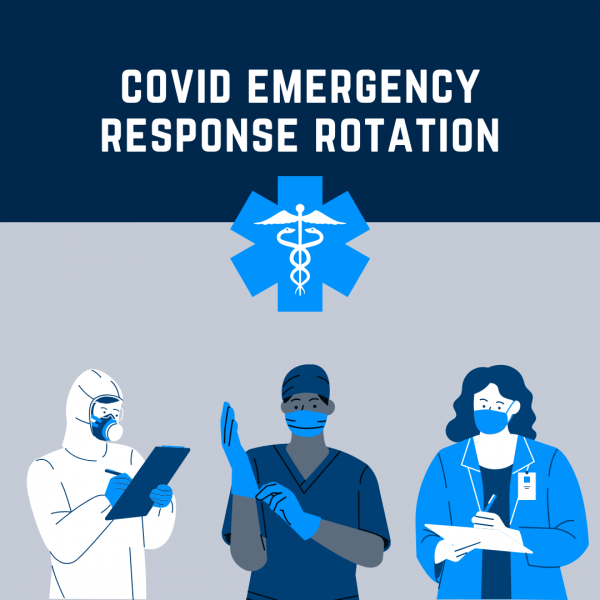Pharmacy COVID-19 Rotation Prepares P4s for Real-World Practice

Forty University of Michigan College of Pharmacy 4th-year students just completed the COVID Emergency Response rotation – the second group to go through the inventive and relevant nontraditional Advanced Pharmacy Practice Experience (APPE). In fact, thanks to quick action and innovative solutions from the U-M Pharmacy Experiential Education team, COVID-19 did not prevent any of the PharmD class of 2020 from graduating on time.
“I have been so impressed with the creativity shown by our faculty and the patience shown by our students,” notes Bruce Mueller, PharmD, Senior Associate Dean and instructor in the course. “Both were equally necessary to make sure everyone graduated on time.”
As mid-March rolled in, so did cases of COVID-19 in southeastern Michigan. “We started to see experiential sites that were no longer able to have students for their APPE rotations. However, most students still needed to complete one more rotation, block 9, in order to achieve graduation requirements,” says Gundy Sweet, PharmD, Assistant Dean for Curriculum Assessment and Clinical Professor of Pharmacy.
Dr. Sweet came up with the idea to develop a new non-traditional APPE focused on COVID Emergency Response. “Developing an APPE that was entirely remote and offered by our College of Pharmacy faculty allowed us the confidence to ensure that all 56 students who needed this block 9 rotation would be able graduate on time,” explains Dr. Sweet.
“Drs. Karen Farris, Amit Pai, and I led development of the APPE, but they had many who helped contribute content including Drs. Toni Coe, Beatriz Mitrzyk, Nancy Mason, and adjunct clinical instructor Noah Leja. Faculty who do not usually lead APPEs - mostly tenure track, research-focused faculty - served as preceptors. It was truly an ‘all hands on deck’ approach with everyone working to achieve the goal of on-time graduation for the Class of 2020,” notes Dr. Sweet.
The APPE blended learning about COVID-19 and the impact the pandemic was having on the healthcare system. Each of the four weeks focused on a different theme: what is COVID-19; navigating the evidence; implications on practice in hospitals, ambulatory care, community care, and health policy; and, ethical decision-making and wellbeing. Small groups of students led by faculty from the Department of Clinical Pharmacy, who served as preceptors, met at least three times weekly for topic discussions and student presentations.
Over the course of the rotation, real-world evidence was taught simultaneously with the real-time Michigan Medicine response to the pandemic. “Weekly interactive webinars led by our faculty content experts including Drs. Jason Pogue (infectious diseases), Michael Kenes (critical care), Deborah Wagner (establishing a field hospital), and Kyle Quirk (palliative care) provided the front-line perspective,” adds Dr. Sweet.
While it occurred at a very stressful time for everyone, the COVID APPE was an exciting opportunity for faculty and students. Not only was it a novel approach for a non-traditional APPE, but the content was relevant to preceptors and students alike.
“We were all learning together as the pandemic unfolded around us. Those who developed content for the APPE were literally building the airplane while it was flying. Many of the faculty who served as preceptors were able to interact with our soon-to-be graduates in a new way, on an experiential rotation. And students were provided with a thorough understanding of the pandemic that they would soon face as they entered their careers. We are quite proud of how we all pulled together as a team to offer this APPE,” says Dr. Sweet.
Students gave high praise for the new rotation, and noted how it prepared them for entering the workforce, residencies, and fellowships at an unprecedented time. “I GREATLY appreciate the non-traditional COVID Emergency Response APPE that was made in response to the pandemic,” said one student. “I learned valuable information and of resources that has better equipped me to begin my career as a pharmacist during the COVID-19 pandemic.” Another student added that the rotation “gives me plenty of opportunities to learn to be critical of the available evidence, and to learn how to orient myself amongst the massive amounts of new studies, information, and misinformation that comes out each day.”
In addition to the new COVID Emergency Response APPE, the Experiential Education team developed strategies to modify student APPEs to ensure that everyone received the required rotations to meet state law, accrediting body, and College requirements for graduation. Third year students also had their rotations adjusted to ensure that they could begin their fourth year APPEs on time.



